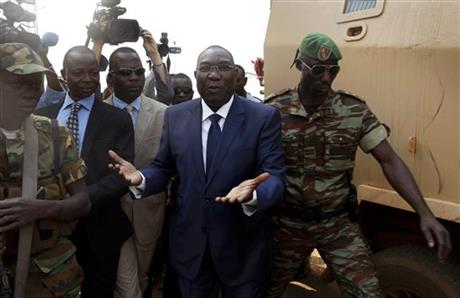
By ABUBAKAR MOHAMMED and KRISTA LARSON
FILE _ This is a Thursday Dec. 19, 2013 file photo of Michel Djotodia, Central African Republic’s president, as he walks back to the Chadian armored vehicle he arrived in following his meeting with US Ambassador to the United Nations Samantha Power at the airport in Bangui, Central African Republic. Djotodia, agreed to resign Friday Jan. 10, 2014 along with his prime minister, regional officials announced. The move comes following growing pressure for Djotodia to step aside and should help placate the armed militias who have used to violence to seek his ouster. However, his departure could also create an even greater power vacuum in a land that has long known coups and dictatorship. (AP Photo/Jerome Delay, File)
Michel Djotodia
FILE – This is Wednesday, Jan. 8, 2014 file photo of Central African Republic President Michel Djotodia, left, shakes hands with assembled dignitaries as he departs for Chad, at Mpoko Airport in Bangui, Central African Republic. Djotodia, agreed to resign Friday Jan. 10, 2014 along with his prime minister, regional officials announced. The move comes following growing pressure for Djotodia to step aside and should help placate the armed militias who have used to violence to seek his ouster. However, his departure could also create an even greater power vacuum in a land that has long known coups and dictatorship. (AP Photo/Rebecca Blackwell, File)
Central African Republic Unrest
A French soldier waves to children as his jeep patrols between the airstrip and a makeshift camp housing an estimated 100,000 displaced people, at Mpoko Airport, in Bangui, Central African Republic, Thursday, Jan. 9, 2014. Embattled President Michel Djotodia who has come under growing pressure to resign, was in neighboring Chad on Thursday for a summit with regional leaders who want to end the bloodshed that has left more than 1,000 dead and nearly a million people displaced. (AP Photo/Rebecca Blackwell)
Central African Republic Unrest
A Red Cross plane takes off next to a makeshift camp housing an estimated 100,000 displaced people, at Mpoko Airport, in Bangui, Central African Republic, Thursday, Jan. 9, 2014. Embattled President Michel Djotodia who has come under growing pressure to resign, was in neighboring Chad on Thursday for a summit with regional leaders who want to end the bloodshed that has left more than 1,000 dead and nearly a million people displaced.(AP Photo/Rebecca Blackwell)
Prev 1 of 4 Next
N’DJAMENA, Chad (AP) — Michel Djotodia, the rebel leader who seized control of Central African Republic only to see the desperately poor country tumble toward anarchy and sectarian bloodshed, agreed to resign Friday along with his prime minister, regional officials announced.
There has been growing pressure for Djotodia to step aside and the resignation should help placate the armed militias who have used to violence to seek his ouster. However, his departure could also create an even greater power vacuum in a land that has long known coups and dictatorship.
Ahmat Allami, the secretary-general of the Economic Community of Central African States, made the announcement following a summit in neighboring Chad on the crisis. Legislators from Central African Republic also were flown to the Chadian capital of N’Djamena on Thursday to take part in the discussions.
Djotodia’s departure leaves the country in the hands of a weak transitional government. Prime Minister Nicolas Tiangaye, a longtime opposition leader prior to the March 2013 coup, is also stepping aside, Allami said.
Central African Republic has long been one of the world’s most unstable countries. The March 2013 coup brought heavily armed rebels to power who then proceeded to carry out atrocities against civilians. The rebels are mostly from the minority Muslim population and hail from the country’s long-marginalized north, and the resentment toward their abuses transformed the conflict into one with religious undertones.
In early December, a Christian militia backed by loyalists of ousted President Francois Bozize attacked the capital. In the violent aftermath, more than 1,000 people were killed and nearly 1 million fled their homes in fear. An estimated 100,000 people alone have sought shelter at the airport being guarded by French troops.
Former colonizer France has sent some 1,600 troops in an effort to stabilize the country and an African peacekeeping force has provided thousands of additional soldiers. However, violence continues to wrack the capital of Bangui. Muslims who are suspected of collaborating with Djotodia’s rebellion have been stoned to death in the streets and their bodies mutiliated.
___
Larson reported from Dakar, Senegal.


